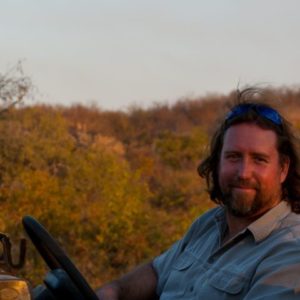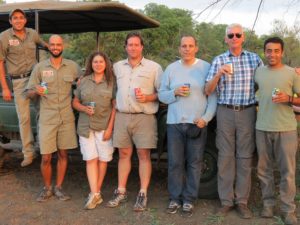Anton Lategon: Saving the planet, one student and one tree at a time
May 25, 2018 - 9 minutes read
An interview with Anton Lategan, one of the owners and managing director of EcoTraining Guides & Guardians, which offers a range of field courses in South Africa, Botswana and Kenya to would-be guides, environmental students or anyone else who wants to learn more about the African bush or mankind’s interrelationship with nature.
What was it about your upbringing in a rural, remote part of South Africa led you to where you are today?
Being surrounded by such natural beauty, it got into my soul. I honestly saw the perfection of nature and the functioning of the ecosystem and how the natural system is sustainable. The interrelatedness of the ecosystem without man’s interference really works! You know water is clean, the natural systems cleans itself, and food is regenerated with the seasons. There are times of plenty and times of few. There is enough space for individuals and for populations. There is a natural system for energy and carbon resources to regenerate. Nature affects everything I do and everything I believe in.
You seem to view EcoTraining as much more than just a business.
I’ve said to a few people that if I could live ten lives, I would dedicate every life to exactly what we do, hopefully learning a few more lessons from nature along the way. We are facing a very fundamental time in the world. There is no denying it — if you look at human population pressure on the globe, if you look at global warming, if you look at competition for resources. There are a lot of other natural factors and considerations that need to be integrated into this modern way of thinking.
Never before have we had a means of everyone communicating with each other at once — as is now possible through the media, social media, internet and mobile devices. That represents promise to me. That represents opportunity. I’m not a big artificial media person. I don’t go onto Facebook. I really am semi-computer illiterate by choice. But if we can get the right message out to the world, and the message is a beautiful one, and the message is actually inspiring, I believe we can actually turn the whole thing around. We need to use modern media and technology to reach people with a message from nature.
What are some ways that EcoTraining is transforming the world?
I had the privilege of meeting a man from China a few years ago and we got talking and he said he would like to bring some Chinese students to do EcoTraining courses. And I said you’re a very good man and I will work with you as long as I’m able to be honest with you. China is one of the biggest impactors on the global environment. If we are to train Chinese students, I need to tell them that they are part of the problem and they need to be part of the solution and we must address issues like ivory trading, lion and tiger bone trading, deforestation and sustainability.
He said that’s why we found you and why we want to work with you at EcoTraining. Then he invited me over to China and I was privileged to speak at Shanghai zoo, the Shanghai botanical gardens and a few universities.
We reached a few thousand people and social media followed. Since then we’ve trained about 25 groups of Chinese students, and one of the things that benefited from that is that they started a nature club in Shanghai they are taking on projects of environmental awareness in Shanghai.
So you don’t think it’s too late to save the planet?
Human beings are very intelligent. But humans have been very selfish, arrogant and we are starting to feel the pinch. Through nature, there are so many wonderful mechanisms that we can evoke or stimulate for a full recovery. There is an ecological sequence from geology and soils all the way up to pollinators and decomposers.
We need to let these processes function to allow for their well-being and ours. What man has done is that we have cut the threads of the functioning ecosystem up into blocks and fenced them off, contained them.
Where would you start?
I think global warming can be turned around just by exercising the secondary succession of ecology. How so? Well, there are seven billion people. We perceive that as a problem, but I see that as an opportunity. What if seven billion people all decide to plant a tree, an appropriate tree, an indigenous tree, in the right environment? I’m not talking about an arbor day exercise — I’m talking about a seven-billion-tree moment.
We understand the process of incoming solar radiation going into the leaves and that photosynthesis produces oxygen. We understand the transfer of nitrogen into the soils and the protection of soil moisture content under the leafy layer. We understand the biodiversity that develops in more moist soil conditions and all the benefits of plants. So, I propose that seven billion people can potentially save the world from global warming by planting enough trees.
I don’t know where the tipping point is, but there is a number where the entire global system can recover from enough trees being planted. For example, if we plant trees every three months, somewhere around the 14- or 21-billion tree mark we are going to turn this entire environmental thing around. Maybe I’m too simplistic, but maybe that’s all it takes!
The role and consequences of the benefits of plants and trees in an ecosystem can produce such good spin-offs. I’ve got a house here in Nelspruit (South Africa) that I bought about 14 years ago. It was sort of a new area and so it didn’t have established gardens. So I started planting trees. I planted about 60 trees in my own garden and the parkland or municipal area around my house. Everyone thought I was nuts. But soon I had 14 species of birds nesting in my garden environment when there were zero before. Then I started to see butterflies and bats. Now I even get thick-tailed bush babies and monkeys coming through. And big birds like trumpeter hornbills, goshawks and owls. It’s amazing. It was an absolute pleasure to watch the natural system recover.
Anyway, my mission is certainly not limited to my own garden. This is just a simple example of how one person can change a little micro-environment. If you multiplied that by a few billion people and . . . you know what? You’ve got a major impact. Nature wants to recover, we simply need to let the beautiful system work and by planting enough trees biodiversity has a foothold for the future.
0 Comments